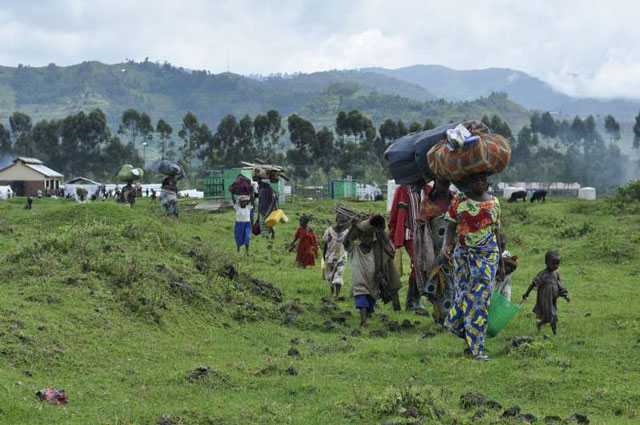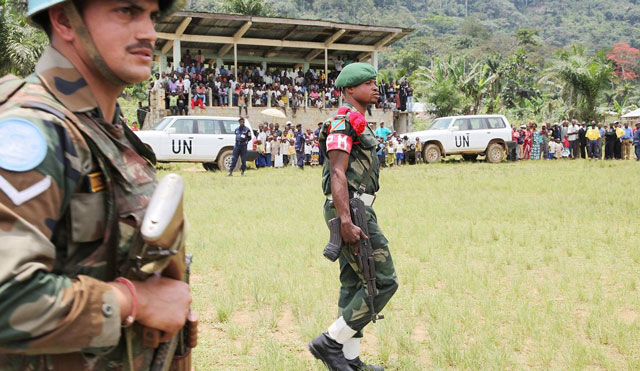
DR Congo war: Why it tops world’s most neglected crises
ANALYSIS | RONALD MUSOKE | The Democratic Republic of Congo tops the list of the world’s most neglected displacement crises according to the latest report by humanitarian non-profit organisation— the Norwegian Refugee Council.
“The Democratic Republic of Congo has become a textbook example of neglect. It is one of the worst humanitarian crises of this century, yet those inside and outside of Africa with power to create change are closing their eyes to the waves of brutal and targeted attacks on civilians that shatter communities,” said Jan Egeland, the Secretary General of the Norwegian Refugee Council, while launching the report on June 1.
“That the world’s most neglected crises are all in Africa points to the chronic failure of decision makers, donors and the media to address conflict and human suffering on this continent,” he said, “With the all-absorbing war in Europe’s Ukraine, I fear African suffering will be pushed further into the shadows,” he said.
The aid provided to DR Congo last year equaled less than one US dollar a week per person in need, and the humanitarian appeal was less than half funded, leaving aid workers with impossible decisions as to what and whom to prioritise. In comparison, the Ukraine humanitarian appeal launched 1 March was almost fully funded the very same day.
“The war in Ukraine has demonstrated the immense gap between what is possible when the international community rallies behind a crisis, and the daily reality for millions of people suffering in silence within these crises on the African continent that the world has chosen to ignore,” said Egeland.
“It is not only unjust – this bias also comes with a tremendous cost. Lives that could have been saved are lost. Conflicts are being allowed to become protracted crises and devastate the hopes of generations of people for a better future.”
According to Egeland’s report, the annual list of neglected displacement crises is based on three criteria: lack of funding, lack of media attention, and lack of international political and diplomatic initiative. For the first time, the top 10 list is comprised entirely of African countries and the DR Congo is followed by Burkina Faso, Cameroon and South Sudan on top of the bleak ranking.
Hunger levels are on the rise in most of the countries on the neglected crises list. The already severe food security situation has been compounded by rising wheat and fuel prices caused by the war in Ukraine.
In addition, several donor countries are now deciding or considering to cut back on aid to Africa, and to redirect funding towards the Ukraine response and reception of refugees at home instead.
“The speed at which the UN, the EU and other international partners acted in response to the war in Ukraine should inspire the same urgency for solutions and support to the most neglected crises of our time.”
Uganda appeals
Various foreign forces are engaged in military operations against armed groups in eastern Congo. President Felix Tshisekedi has invited Ugandan forces into the northeast for joint military operations against the Allied Democratic Forces (ADF), an Islamist armed group led by Ugandans. Burundian troops have undertaken incursions against the Burundian armed group RED-Tabara (Résistance pour un état de droit au Burundi) or the Resistance for the Rule of Law in Burundi, which is based in South Kivu province.
The United Nations Organisation Stabilization Mission in the Democratic Republic of the Congo (MONUSCO) is providing military support to Congolese government forces.

Armed conflict in North Kivu province since May 22, 2022, has forced tens of thousands of people to flee their homes, as M23 rebels launched their biggest offensive against government troops in a decade. On May 25, heavy fighting reached the outskirts of the provincial capital, Goma.
Northeastern DR Congo has particularly been plagued by intercommunal tensions and conflict, with a dramatic increase in attacks on internally displaced camps since November 2021. About 5.5 million people are now displaced within the country and food insecurity has reached the highest level ever recorded, with a third of the population going hungry.
Tens of thousands more have fled to neighbouring Uganda for safety, piling more pressure on the government of Uganda.
The Norwegian Refugee Council’s report captures the sentiments of a 37-year old mother from Ituri province who recently lost five of her family members in a massacre and her house was completely destroyed.
“I can’t plan for my children’s future; there is nothing beyond finding food each day. The world doesn’t know how we suffer here,” she said.
In April, this year, the United Nations High Commissioner for Refugees (UNHCR) alongside 44 other humanitarian organisations sent out an appeal to the international community for a kitty of about Shs170 billion (US$48 million) to help them respond better to the basic needs of thousands of refugees who are fleeing war in their home countries into Uganda.
The UNHCR said the “Uganda Emergency Appeal” would cover a three-month initial emergency response for an influx of up to 60,000 refugees in Uganda. Funding is expected to support urgently needed healthcare supplies, and water, sanitation and hygiene services needed to prevent the spread of COVID-19 and other diseases.
The appeal from the humanitarian agencies came just weeks after the government of Uganda stopped short of blocking refugees running away from violence in the Democratic Republic of the Congo (DRC) and sporadic clashes in South Sudan.
Hillary Onek, Uganda’s Minister for Relief, Disaster Preparedness and Refugees recently said the government was failing to cope with the influx of refugees and was considering discussing with both the governments of South Sudan and DR Congo the possibility of sharing the burden.
He said Uganda was considering asking the two governments to either contribute resources or keep its fleeing people in other more peaceful parts of these countries.
Since January, this year, Uganda has received over 35,000 Congolese refugees with a third of this number arriving in recent weeks after fleeing fighting in the North Kivu and Ituri provinces.
Rwanda clashes with DRC
Meanwhile, on the same day the Norwegian Refugee Council published its report, Human Rights Watch urged the Congolese army and the rebel group, M23, to minimize harm to civilians following the latest confrontation between the two forces in eastern DR Congo.
The fighters in eastern Congo are bound by international humanitarian law, including Common Article 3 to the 1949 Geneva Conventions, which prohibit summary execution, rape, torture, forced recruitment, and other abuses.
“The M23 armed group was responsible for countless atrocities in the past and the renewed fighting in North Kivu raises grave concerns about the danger to civilians in the area,” said Thomas Fessy, the senior Congo researcher at Human Rights Watch.
“All parties, including rebel forces, security forces of Congo and its neighbours, and United Nations peacekeepers, are obligated under international law to spare civilians.”
Since hostilities resumed, the governments of Rwanda and Congo have traded accusations about the fighting. Rwanda said the Congolese army fired rockets onto its territory, “injuring several civilians and damaging property.” Congo alleged that the Rwanda Defence Force (RDF) was actively fighting alongside M23.
Rwanda has alleged that the Congolese army was collaborating with the Forces Démocratiques de Libération du Rwanda (Democratic Forces for the Liberation of Rwanda, or FDLR), a largely Rwandan Hutu armed group operating in Congo, some of whose members took part in the 1994 genocide in Rwanda.
Rwanda says they recently “kidnapped two of its soldiers while on patrol” along the border. On May 29, a Congolese military spokesman said it was holding two Rwandan soldiers “captured by the population.”
The regional Expanded Joint Verification Mechanism (EJVM) of the International Conference on the Great Lakes Region (ICGLR) says it is preparing a report on the situation. The EJVM should make its findings public, Human Rights Watch said.
Human Rights Watch previously documented war crimes by M23 rebels who, supported by Rwanda and Uganda, took over large parts of North Kivu province in 2012.
After M23 briefly captured Goma, UN-backed government troops in 2013 forced them back into Rwanda and Uganda. M23 fighters summarily executed dozens of civilians, raped scores of women and girls, and forcibly recruited hundreds of men and boys.
Originally, the M23 armed group consisted of soldiers who participated in a mutiny from the Congolese national army in April and May 2012. The then-UN High Commissioner for Human Rights Navi Pillay had described M23’s leaders as “among the worst perpetrators of human rights abuses in (Congo), or in the world.”
They included Gen. Bosco Ntaganda, who has since been convicted by the International Criminal Court for war crimes and crimes against humanity when he led another armed group, and Col. Sultani Makenga, who reportedly led this May’s offensive. Congolese authorities issued arrest warrants for Makenga and other M23 senior commanders in 2013. Rwanda and Uganda never acted on extradition requests made to their countries.
Regional attempts to demobilize M23 fighters have failed over the past 10 years. The group resurfaced in November 2021, attacking Congo’s army, amid claims that President Felix Tshisekedi’s administration was not committed to existing peace agreements, which included amnesties for the group’s rank-and-file. The agreements, however, did not include accountability for the worst human rights abusers.
Following renewed attacks by the M23 in March, tensions escalated in late April as Kenya hosted a first round of talks between the Congo government and a number of armed groups in Nairobi.
Congo expelled the M23 representatives from the dialogue because of the armed group’s renewed fighting on the ground. Only days before the talks opened and as Congo joined the East African Community, its member countries agreed to create a regional force to combat rebels in eastern Congo.
Any new round of talks should address, with assistance from the African Union (AU) and the UN, the demobilization of armed groups and accountability for past serious crimes, Human Rights Watch said.
In Congo, hate speech and stigmatization of communities linked to neighbouring countries has been growing and sometimes linked to government officials. A government spokesman, Patrick Muyaya, condemned a video circulated on social media in which North Kivu’s deputy police commander, Francois-Xavier Aba van Ang, encouraged residents to take up machetes as “war against the enemy must become people’s war.” But Human Rights Watch is unaware of any disciplinary action taken against van Ang.
On May 30, Senegalese President Macky Sall, the current chair of the AU, said he had spoken to both President Tshisekedi and Rwandan President Paul Kagame, and that Angolan President João Lourenço was leading mediation efforts in his capacity as head of the ICGLR.
The current hostilities in eastern Congo should not deter the Tshisekedi administration and neighboring countries from seeking justice for abuses committed during previous armed conflict on Congolese territory, Human Rights Watch said.
“The failure of the region’s governments to seek justice for commanders on all sides implicated in past atrocities heightens concerns for the safety of civilians in any future fighting,” Fessy said. “Governments that assist abusive armed groups like the M23 risk becoming complicit in their crimes.”
 The Independent Uganda: You get the Truth we Pay the Price
The Independent Uganda: You get the Truth we Pay the Price


